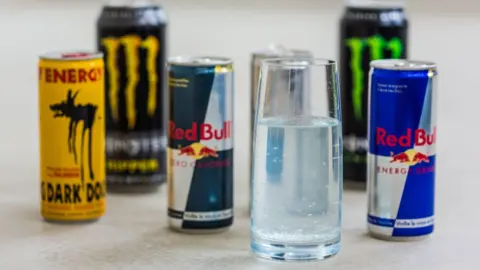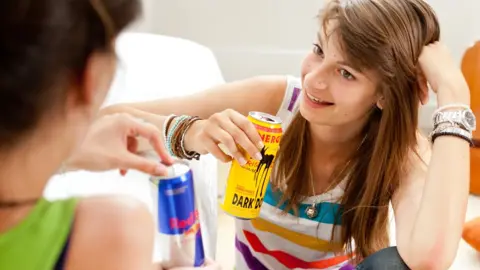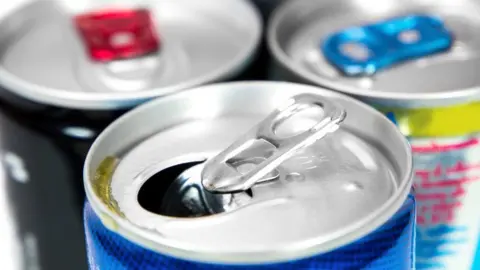Not enough evidence for energy drink ban
 Science Photo Library
Science Photo LibraryExperts advising the government have said there is not enough scientific evidence to warrant a ban on the sale of energy drinks to children.
But the Science and Technology Committee said concerns in society, and evidence from teachers, could "justify a ban."
The MPs recommended more prominent labels, saying the drinks were not suitable for children.
Critics said they were disappointed not to see a recommendation for a ban.
A number of big supermarkets already ban their sale to under-16s due to concerns over the levels of sugar and caffeine in them.
In August the government launched a public consultation into whether to make it illegal to sell energy drinks to children.
Young people in the UK are the biggest consumers of energy drinks in Europe for their age group.
Chairman of the cross-party committee, Norman Lamb, said they had heard a range of concerns which "varied from a lack of concentration in the classroom and hyperactivity, to the effects on physical health".
He added it was "clear from the evidence we received that disadvantaged children are consuming energy drinks at a higher rate than their peers."
But the committee found there was "insufficient evidence" as to whether children's consumption habits are significantly different for energy drinks than for other caffeinated drinks like tea and coffee.
The MPs did find drinking energy drinks correlated with young people engaging in other risky behaviours such as drinking alcohol and smoking, but said it wasn't "possible to determine whether there is any causal link".
 Science Photo Library
Science Photo LibraryNorman Lamb said: "It would be legitimate for the Government to go beyond the evidence that is available at the moment and implement a statutory ban based on societal concerns and evidence, such as the experience of school teachers and pupils. If the Government decides to introduce a ban, it should explain why it has come to this decision."
The committee called on the Government to commission independent research to see whether energy drinks are more harmful than other soft drinks.
The MPs also supported the idea of exclusion zones of sales to children around schools.
They said that despite statutory labelling on energy drinks that they are not recommended for children, "a significant number of young people continue to consume these products, and some in excessive amounts." leading to concerns that children and their parents do not fully understand what they are consuming.
The committee said the Government should use the opportunity of leaving the EU to introduce additional - more prominent - labelling requirements on energy drinks.
 Getty Images
Getty ImagesProfessor Russell Viner, President of the Royal College of Paediatrics and Child Health (RCPCH) said it was "disappointing not to see a recommendation today to ban the sale of these drinks to children.
"We believe that the evidence is already compelling that energy drinks bring no benefits and only harm to children."
The committee members said they had heard from a number of witnesses who argued that the low cost of energy drinks made them more accessible to children.
Prof Viner said the Government should introduce "a minimum price for energy drinks as we know their cheap price tag is a key driver for their purchase".
The NASUWT Teachers Union gave evidence to the enquiry. Chris Keates, general secretary said: "Teachers and school leaders continue to see first-hand the contribution energy drinks can make to poor pupil behaviour and pupils' ability to concentrate in class."
The union said the voluntary bans implemented by retailers were "helpful" but don't go far enough, and "a blanket ban is needed."
